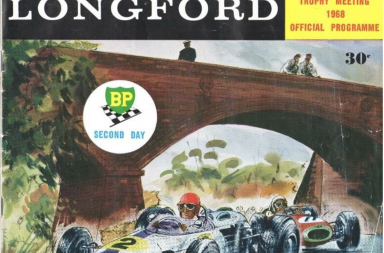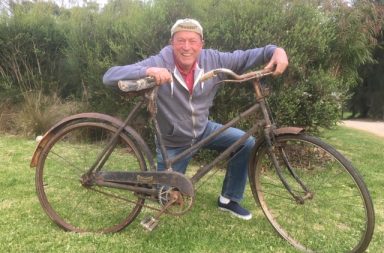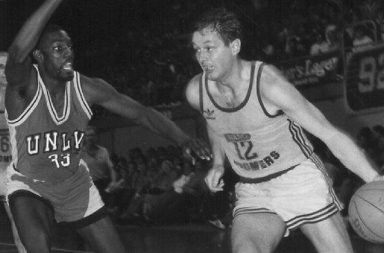Feature written 2004. Gus passed away in 2010, aged 82
Gus Mercurio has been a boxing man for over 60 years and a much-loved actor for half that time – but it’s the horses that have done the damage.
He first hurt his back in a fall from a horse when making the ‘70s television series Cash and Company – and then a thundering steed tossed him into a stream in the downhill chase of the movie Man from Snowy River.
He needed five more back operations, surgery to insert steel plates in his spine, after a car accident while filming a series in the Kimberley.
These days the popular old stager walks like he just got bucked off a bronco.
His calves are wasted from nerve damage – but he still likes to ride when he can, bareback with his knees tucked in to the horse, on a friend’s place at St Andrew’s, in the hills north-east of Melbourne.
Gus has an affinity with horses, though not always for staying on them, and in his film work he insisted on doing his own horse stunts.
“I made a choice,” he says in his shed at the rear of his Melbourne home.
“I wanted to earn it (by doing the stunts), so I wear the consequences.
“It’s like an old fighter who goes too long. “It’s his choice.”
You learn a lot about a man by what’s in his shed, and Gus surrounds himself with the keepsakes of a colourful life.
First you notice the hats – over a hundred of the lids that have hung like verandahs over his craggy countenance.
In a corner, his latest creative work – the Shiraz he produced from the eight vines in his back yard.
But Mercurio’s other identities – the screen personality, horseman, chiropractor, early life in America – are kept to a supporting role in his shed, because this is a shrine to boxing.
“Boxing has always been my thing,” he says, sitting amidst the fight books, pictures and paraphernalia.
“I was only a prelim fighter, an opponent for someone better, but I loved every bit of it.”
At 76, he still judges championship bouts around the world. Just three weeks ago he scored a WBC world bantamweight title fight in Thailand, outdoors in 38 degree heat.
He was the son of a prize-fighter in America’s mid-west – his dad fought under the name of Vince McGurk, and got banned for hitting a referee.
Professional boxing put Gus through four years of a college degree – he has a Doctorate of Chiropractic.
Boxing helped bankroll his trip to Australia – he used the $3000 he was paid for his only main event fight, a third round defeat in Seattle in 1955, to settle in Victoria.
It was his on air presence as the gravel voiced boxing commentator for Channel 0’s fights, Channel 9’s Golden Gloves and later for Channel 7’s World of Sport that prompted Crawfords production company to phone him and offer him a guest lead on Homicide.
His first evening in Melbourne was like a scene from a wallaby western.
Gus moseyed into a bar off Collins Street and saw the barman setting up a row of 10 glasses of beer.
Unaware of how Australian men guzzled during the “six o’clock swill”, he grabbed one of the full glasses and took a swig.
The drinker who had ordered the 10 beers promptly snatched the glass from Gus and threw its contents over him, so Gus responded in the fashion he regarded as appropriate.
“I hit him with a beautiful shot, a left hook,” he recalls.
“He didn’t go on with it.”
Next day Gus felt sheepish when the “six o’clock swill” was explained to him.
His big break in Australian boxing came during the Rose-Rudkin world title fight at Kooyong in March 1969, when he judged a preliminary bout and then climbed up into the commentary box to call the main event on radio with Jimmy Taylor, the South Melbourne footballer.
Gus is a driving force behind the Australian boxing Hall of Fame, and is passionate about honoring the past champions.
“Those guys in the stadium days were real fighters.
“On fight nights there was a queue behind the door of men waiting in line in case the doctor didn’t pass a fighter fit, and someone needed to step up.
“There were fights outside the door among the blokes waiting to get in.”
Gus still gets a thrill out of throwing punches, and every Monday, Wednesday and Friday he rips into the punching bags in his shed.
“I like getting my punches in there, the combinations.
“I like the one-on-one thing.
“I’m not much into team sports – I love boxing because it’s your skill, courage and fitness against somebody else.”
He understands how attitudes have turned against a sport in which two men hit each other, yet he’ll go to that great ring in the sky believing that the world would be a better place if every kid put on a head-guard and 16 ounce gloves and learnt the rules according to the Marquis of Queensberry.
“It’s the answer to bullying – show a kid how to fight, or at least to throw one punch.
“Boxing teaches skills that everyone needs – to fight on when you’re hurt, to make decisions in the face of danger.
“If you can climb up and step into a ring, what else can faze you?”
Gus has judged or refereed thousands of bouts – he was referee for the world title match between Barry Michael and Lester Ellis.
He laughs about the aftermath of a close contest between Ellis and Tony Miller, when the other two judges awarded a split decision, and the ring announcer told the crowd that the result would be decided by the third judge, Gus Mercurio.
When it was broadcast that Gus had awarded the split decision to Ellis, an angry fan confronted him on the way out of the stadium and challenged him to a brawl.
Despite his back injuries and generally delicate health, Gus tossed off his coat with trademark flair and shaped up – until the security men stepped between the two combatants.
“I never even got a chance to bounce the guy,” he laments.
But Gus did spend the next fortnight with his chiropractor.
He had flung off his coat so aggressively that his crook back was sore for a long time.
Gus Mercurio passed away in 2010.



